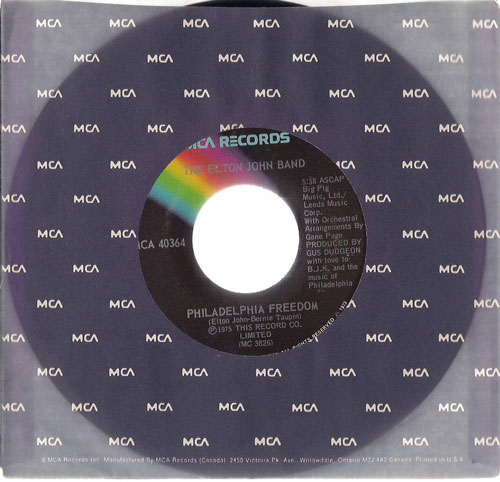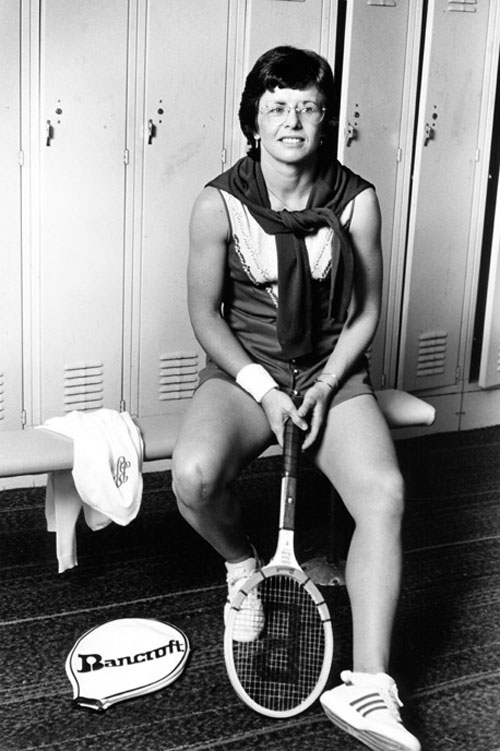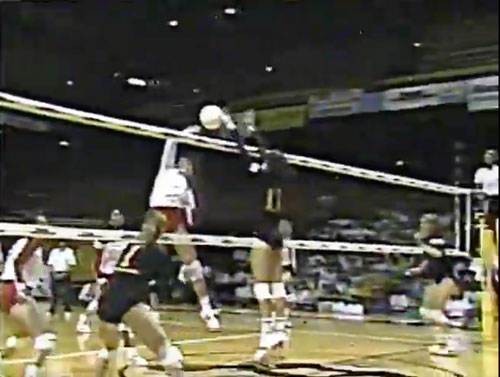Out Of Our League
Is there room for another mainstream sports league? Despite lots of attempts over the years to introduce new pro sports, the answer appears to be no.
200+
The number of players, including some former MLB stars, that were a part of the Senior Professional Baseball Association, a startup league formulated in 1989 in an attempt to offer a second act to former stars, along the lines of the PGA’s Senior Tour. The idea didn’t stick, however, and the league shut down in the middle of its second season.

The "Philadelphia Freedom" single. (Vinyl Mine records)
How a relatively obscure tennis league inspired one of Elton John’s chart-topping hits
Divorced from the context of 1975, Elton John’s “Philadelphia Freedom” doesn’t seem to make a whole lot of sense. It’s a song by a British guy with lyrics extolling the greatness of Philadelphia. Sure, the U.S. bicentennial was coming up, but the song was a bit early—it wasn’t happening for another year. (Why didn’t he just save it for his next album?)
The chorus offers up a storyline which could best be described as a little offbeat, coming from a person who never lived in Philly: “‘Cause I live and breathe this Philadelphia freedom / From the day that I was born I've waved the flag / Philadelphia freedom took me knee high to a man / Mm, gave me a piece of mama, daddy never had”
So why this song, at this time? As it turns out, the lyric was a somewhat obscured ode to John’s friend Billie Jean King.
In 1973, King’s then-husband Larry—who was not a talk show host—cofounded World Team Tennis with a group of fellow investors. At the time, it really stood out: It was a mixed-gender sports league, something that’s rare even today.
The league (which also had backing from, among others, Jerry Saperstein, the son of Harlem Globetrotters founder Abe Saperstein) had 16 teams at the time of its launch, which was quite ambitious for a new league—as was the payroll, which The New York Times estimated would average around $400,000 for teams of just six players.
But unlike most new sports leagues, it had big-name stars. Jimmy Connors got himself banned from the 1974 French Open after he signed a contract with World Team Tennis. The league also, of course, had Billie Jean King, who was on a bit of a roll at the time. She had just made a name for herself by embarrassing Bobby Riggs in The Battle of the Sexes, a much-hyped tennis exhibition that carried some major cultural impact.
With World Team Tennis, King took on a player-coach role with the Philadelphia Freedoms, which, yes, inspired the song’s name. Yes, that’s right. Elton John made a song about a coed professional tennis team.
So how did John and his lyricist partner Bernie Taupin end up writing this song? Taupin clearly was less into the concept than John was—considering the lyrics at no point mention tennis. But John was inspired after King had fashion designer Ted Tinling custom-design a warmup suit for the pop star. According to The Billboard Book of Number One Hits, John had pledged to the tennis icon that he would write her a song as a thank you for the gift—a claim King didn’t initially believe.
But before a playoff game in Denver, Elton came back with the goods.
“He came back to the dressing room—I had a real important match to play—and was all excited, saying, ‘You've got to listen to this tape. This is it, the song I wrote for you. Do you like it?’ So he played me a rough mix of ‘Philadelphia Freedom’ and of course, it was great,” King recalled. “And when he got to the chorus he said. ‘Listen to this part, the beat.’ So I listened. ‘Hear the beat?’ he said. ‘That's you when you get mad on the court.’”
The song, which was released as a standalone single, included the note that the tune was made “with Love to B.J.K. and the music of Philadelphia.”

Billie Jean King, circa 1978. (Lynn Gilbert/Wikimedia Commons)
The strange part abut the tune was that, as “Philadelphia Freedom” was hitting the top of the Billboard Hot 100, the fortunes of the team he sang about were going in the exact opposite direction—as tends to happen with young sports leagues, which often aren’t financially stable. The team had been sold to a Boston-based ownership team, which eventually turned the franchise into the Boston Lobsters (yes, that was really its name). King was traded to the New York Sets, a franchise she led to a championship win in 1977.
It was hard to miss the weird timing of the song’s success.
“Elton John's latest hit, ‘Philadelphia Freedom,’ has gone right to the top of the pop music charts,” a blurb in the Philadelphia Daily News reported at the time. “Ironically, the team his song is about has just gone, period.”
The original version of the league, likewise, was gone just a few years later, with eight teams folding at the end of the 1978 season. The league was revived a few years later and is active to this day, with Billie Jean King holding a primary ownership stake in the league for decades, only largely selling it off earlier this year.
But one thing she does still own? The Philadelphia Freedoms, a club she revived in 2001.
“The key this year will be our marketing. We'd like to see a lot of sampling of the game because if people see it, they like it—and they come back.”
— David B. McLane, the chief operating officer and marketing director of Roller Hockey International, a sports league that was built around an ice-free form of hockey, explaining its business strategy. The league did better than some other leagues of its nature, earning promotional deals with Pepsi and Taco Bell, but the league’s instability ultimately did it in. (Side note: One of the best resources on this league, which died in 1999, is a Tripod page.)

A Major League Volleyball championship game in action. (via YouTube)
The story of Major League Volleyball, a failed sports league that was quietly groundbreaking
Like gymnastics except in team sport form, volleyball was having a bit of a moment in the late 1980s. The 1984 Olympics put a lot of attention on volleyball, along with massive ratings.
And this success was reflected culturally. The Nintendo Entertainment System had numerous volleyball video games, and there were even movies with volleyball-themed plots. The 1986 direct-to-video filmSpiker, starring a pre-Kill Bill Michael Parks (rest in power) as the USA Volleyball coach, is just one example of what felt like a full-on trend for a few years.
Clearly, if there was a moment for volleyball to have a shot as a mainstream sports league, 1987 was that moment—especially as ESPN was looking for things to air at the time. And volleyball is a pretty high-action sport, too—it had the potential to be good TV.
Major League Volleyball, which was initially owned by a single company, came with a more noble goal, perhaps, than the video games and sports movies. There was no cheesy beach imagery here: Instead, it broke barriers as one of the earliest women’s professional team leagues with televised games. They were sometimes tape-delayed, sure, but you could still watch spikes and volleys on your TV.
The league came with many of the trappings of larger sports leagues, but as Sports Illustrated noted in a 1987 article, it was not a top-tier league: Pay was limited and the league treated players already on the U.S. Olympic team as off-limits.
“The MLV offers a vehicle for women who are not good enough to compete in the top leagues in Japan and Italy and a chance to demonstrate to the paying public that volleyball is more than fun at the beach,” a 1987 Los Angeles Times article explained.
(Despite this, the league deferred pay and offered per diems to players, on the off chance one of the pro league’s players got a shot at the Olympics. If the players wanted to stay amateur, they could.)
And everything was on a shoestring. Steve Arnold, the league’s commissioner, told Sports Illustrated, “Our total budget is less than Don Mattingly's annual salary.”
Drake Misek, a University of Michigan women’s volleyball fan, actually dug into the saga of MLV in a Medium piece out of disappointment that the college volleyball season was over and he had no options for watching indoor volleyball on TV. It was a league riddled with disappointments, big and small: The league tried and failed to find big sponsors, turnover among players was high, and attendance numbers were often mixed, with teams in smaller markets drawing far larger numbers than markets with other major sports teams. The Los Angeles Starlites, despite dismal attendance numbers, were champions in both of the league’s completed seasons.
And that imbalance ultimately did the league in. In March of 1989—in the middle of MLV’s third season—the league’s cash-flow forced a shutdown.
"For a combination of reasons, whether it be the lack of local ownership, the marketplace, or the way the teams were promoted, the franchises in New York, Chicago and Los Angeles failed financially," Gary Schwing, the owner of the San Jose Golddiggers, told the Los Angeles Times. “The owners of the three successful franchises were unable to bail out the other three (teams), and the league was forced to suspend operations."
Misek, who spent a lot of time in his post discussing the fact that women's sports in the United States pale in comparison to other countries, noted that despite MLV’s short existence, it was nonetheless an important league—forging an initial single-entity ownership structure that influenced other fledgling leagues (specifically Major League Soccer) and finding a way to balance the needs of players with both amateur and professional interests.
“And yet, for all its problems, we simply cannot downplay MLV’s enormous accomplishment: they offered pro women’s volleyball in the U.S. on ESPN for two full seasons,” Misek said.
Maybe volleyball didn’t go mainstream, but it was still a hugely noble experiment.
One fascinating thing about many of these leagues is not simply that they failed (or in the case of World Team Tennis, quietly putter along), but the fact that the people running the leagues were often repeat offenders in embracing alternative sports leagues.
Harlem Globetrotters heir Jerry Saperstein, who was involved in the launch of World Team Tennis, also spent time as a general manager of the New York Liberties, a Major League Volleyball team.
MLV founder Steve Arnold, meanwhile, also was associated with the the World Football League, the American Basketball Association, and the World Hockey Association. In a 1988 interview with UPI, he claimed he got involved with the MLV in response to the cocaine-related death of a player he managed.
“I got tired of helping guys make money that they abused; they didn't know how to spend it,” he told the wire service. “I figured there had to be a better way.”
Perhaps the most extreme example of someone building a career around obscure sports leagues is Lee Meade, a former sportswriter who was involved with many of the leagues previously mentioned in this article, along with the International Basketball Association, a 1970s attempt to sell Europe on basketball. A 1990 profile on Meade in Sports Illustrated, which described him as “short and volleyball-shaped,” highlighted quotes from colleagues that painted him as a lovable failure.
"A lot of the negative stuff you hear about Lee is that he was involved in everything that failed," lawyer R. Steven Arnold (someone also involved in a wide variety of obscure leagues) told the magazine. "That isn't true. People have made a lot of money on things Lee has been involved in. Unfortunately, Lee hasn't been among them."
For some people, their field of dreams is a left turn.
:format(jpeg)/2017/06/tedium052317.gif)
/2017/06/tedium052317.gif)

/uploads/ernie_crop.jpg)